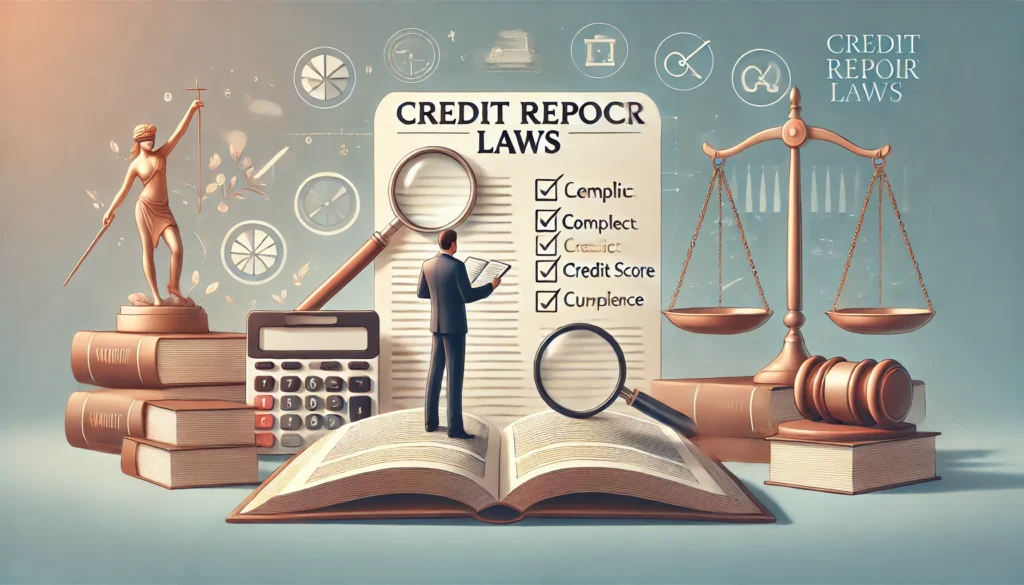Starting to grow your credit repair business means you need to understand the industry well. You should also assess where your business stands right now. This groundwork will help guide your growth towards success. By knowing the chances you have and the problems you face, you can create better strategies.

The credit repair industry is changing. New rules, more informed consumers, and new technologies are all affecting it. Before you make any moves to expand, spend some time looking at your current business model, client base, and market position. This will help you see what you do well and where you can improve. With this knowledge, you can make smart choices that fit your growth goals.
Understanding the Credit Repair Industry Landscape
The credit repair industry changes often. It is affected by the economy, how people behave, and new rules. To have a successful credit repair business, it is important to know about these trends and adapt your strategies.
One major trend is the growing use of technology. Credit repair software and online platforms are becoming essential. These tools make processes easier, improve communication, and increase the efficiency of managing clients.
In addition, people are now more informed than ever. They look into credit improvement choices and prefer businesses with good results and reviews. Being open about your services, having a strong online presence, and focusing on client education can help you stand out in this aware market.
Analyzing Your Current Business Position
Doing a SWOT analysis of your credit repair business can help you make smart choices. This analysis looks at your strengths, weaknesses, opportunities, and threats. Understanding where you stand now is key to finding ways to improve and grow.

Check your current business plan, how well you are doing financially, how you get clients, and how you’re competing in the market. Looking closely at how your credit repair business runs can give you important information about what is working and what may need changes for future growth.
Do you focus on a specific market? What are your best marketing methods? Are there new customer groups you could reach? By asking these important questions about your credit repair business, you can create a better plan for growth that uses your strengths and fixes any weaknesses.
Building a Strong Legal Foundation
As you grow your credit repair business, it’s important to have a strong legal base for being successful over time. It’s key to understand credit repair laws and rules. This helps you keep your business and your clients safe.
Make sure you know federal laws, like the Credit Repair Organizations Act (CROA) and the Fair Credit Reporting Act (FCRA). It’s also crucial to keep up with rules in each state because they can be very different. Not knowing these laws can lead to major penalties.
Navigating Credit Repair Laws and Regulations
The credit repair business works under rules from federal and state laws that protect consumers. It is important to know and follow these laws to run a good and real credit repair business. The Fair Credit Reporting Act (FCRA) is very important in this legal setup.

A key part of the FCRA is making sure credit reporting is fair and accurate. If you run a credit repair business, you need to understand and follow the FCRA guidelines. You must educate your clients about their rights to see and challenge information on their credit reports. You should also make sure that any disputes you file for them have real evidence to support them.
Honesty and good behavior are very important in the credit repair process. You should clearly tell clients about your services, fees, and how long things will take. Do not make false claims or promises about improving credit scores. Doing so is against the FCRA and could lead to serious issues.
Ensuring Compliance with Federal and State Guidelines
- Learn about the Credit Repair Organizations Act (CROA) as well as the FCRA. This act sets rules for credit repair companies.
- CROA requires them to inform clients of their rights, including the right to stop services within a certain time.
- Always give clients written contracts. These should detail all services, fees, and terms. Keep clear records of every client interaction.
- Your state may have its own rules, adding more requirements. This can include things like licensing, bonding, and special advertising rules.
- It’s important to research your state’s rules well. You might also want to talk to a lawyer who focuses on consumer law to make sure you follow all laws.
- Sticking to federal and state rules is an ongoing job. Laws can change, so stay updated on any changes.
- Set up internal processes to review and change your company’s policies to meet the latest rules.
Enhancing Your Business Structure
A strong business structure is very important for managing more clients and services. You might need to look at your business model, improve how things work, and strengthen your team to meet the growing demands.
As your credit repair business grows, its structure should grow too. Check often if your current setup helps with your growth plans. This means looking at your pricing model, workflows, and how you use resources. Keeping your business structure in line with your expansion goals will help you make the shift easier and increase your chances of lasting success.
Choosing the Right Model for Expanding Your Credit Repair Business
Whether you began as a sole proprietorship or an LLC, it’s important to think about how each structure will impact your business as you grow. Each model has its own benefits and downsides regarding liability, taxes, and administrative tasks. Talking to a business lawyer or accountant can give you helpful ideas that match your goals.
Consider how your business model will address future hiring, possibly working with partners, or bringing in investors. It’s crucial to look closely at your legal and financial situation to build a strong base for growth.
Also, think about different service plans and pricing options. Can you offer subscription services, premium advice, or packages that change based on what clients need? Providing a variety of services could draw in more clients and create different income levels, helping your successful business to grow even more.
Streamlining Operations for Efficiency
Efficiency is important when you have many clients. Small business owners often do many different jobs. However, as your business grows, it is essential to share tasks with others and use technology to help. You should invest in credit repair software. This type of software helps with communication, document processing, and managing clients. It can save time and reduce mistakes, leading to better client satisfaction.
Take a look at how you do things now. Are there any steps that slow you down or are useless? Can you automate any tasks or get help from others? Could changing how your team works improve productivity? Using technology and improving how you work will help keep your service high as your client base grows.
Think about using project management tools, team collaboration apps, and cloud storage. These can help with communication and teamwork. Using these tools will give you more time to focus on important business activities and key decisions.
Advanced Marketing Strategies for Credit Repair Services
As your credit repair business grows, your marketing needs to grow too. To reach more people and get new clients, you should use a mix of marketing methods. This means using both online and traditional ways to promote your business.
Relying only on word-of-mouth is not enough anymore. A successful credit repair business must take a proactive approach to marketing. It’s important to create a complete digital marketing plan. This plan should include search engine optimization (SEO), social media marketing, and possibly paid ads. These steps are key to finding your ideal client base in today’s online world.
Developing a Digital Marketing Plan
A good digital marketing plan helps you attract potential clients who need credit repair. Start by researching helpful keywords. This way, you will know what search terms your target audience uses. Use these keywords in your website, blog posts, and social media profiles to boost your search engine rankings.
Email marketing is still a strong way to nurture leads and encourage sales. Offer useful content like free credit repair guides, e-books, or webinars to get more subscriptions. Use email automation to send personalized messages based on how users act. You can also segment your audience for more focused email campaigns.
- Content Marketing: Post informative and engaging blog posts, articles, and videos regularly. These should tackle common credit repair issues, give helpful tips, and highlight client success stories.
- Social Media Engagement: Build a solid presence on social media platforms where your target audience spends their time. Share useful content, join in on relevant discussions, and run targeted ad campaigns to reach more people.
Harnessing the Power of Social Media
Social media is a strong tool to help build brand awareness, show your skills, and connect with your target audience. First, find out which platforms your ideal clients use the most. Is it Facebook, Instagram, LinkedIn, or a special site about personal finance?
Next, share useful content that teaches and speaks to your followers. You might post about:
- Credit Tips: Give short advice on how to improve credit scores, manage debt, and build good credit habits.
- Client Success Stories: Share positive reviews and examples that show how your credit repair services have helped people.
- Industry News and Insights: Update your audience about the latest trends and news in credit repair.
Engage with your followers by replying to comments and answering their questions. Create a sense of community. Use the right hashtags, run contests, and team up with influencers to reach more people. This will help position your business as a reliable source of credit repair information.
Expanding Your Client Base
Sustainable growth means looking beyond the customers you already have. Finding new groups of people and exploring new clients can help you grow and attract more business.

Be creative. People with bad credit are a main group for credit repair services. But you should also think about focusing your services on different groups. For example, you could make special campaigns for young adults just starting to build their credit or for people getting ready to apply for a mortgage.
Identifying and Targeting New Market Segments
Attracting new clients needs a smart approach. You should focus on markets that can benefit from your credit repair services. Start with market research to find potential customers outside your current client base. Look at their ages, credit issues, financial goals, and online habits.
Think about targeting these specific groups:
- First-time homebuyers: Work with real estate agents and mortgage brokers. They can help clients who need credit improvement to get a mortgage.
- Small business owners: Provide special credit repair services. This helps small businesses build business credit and find funding.
- People bouncing back from money problems: Aim at those recovering from bankruptcy, foreclosure, or job loss. They need credit repair to feel stable again.
When you adjust your marketing messages and service offerings for these groups, you can connect with potential customers better. This approach meets their unique needs and matches their financial goals.
Leveraging Partnerships and Affiliates
Partnering with other businesses is very helpful. It can help you meet new people, build trust, and reach more clients. Building relationships with companies that appeal to the same target audience can create good teamwork. Think about teaming up with:
- Financial advisors: Many people who want help with finances might also need credit repair services.
- Mortgage brokers: These experts often work with clients who need to improve their credit scores for home loans.
- Credit counseling agencies: While these groups are not direct competitors, they may have clients who can use your specific services.
Make sure to set up clear partnership agreements. These should include referral procedures, commission plans if needed, and guidelines for sharing information. Keep the lines of communication open, give great service to referred clients, and strengthen these connections for lasting success. You could also offer co-branded webinars, workshops, or educational tools to make these partnerships even stronger.
Offering Comprehensive Credit Solutions
Positioning yourself as the go-to place for everything about credit can help keep clients loyal and create new income sources. Think about adding more services beyond basic credit repair.
You might want to include credit monitoring, programs to teach financial skills, and identity theft protection in your business model. By catering to a broader range of client needs, you can improve their financial health and strengthen your role as a trusted advisor.
Broadening Your Service Offerings
While fixing mistakes on credit reports will always be important, adding more services can help you reach more people. Think about providing full financial education programs. These programs can help clients learn how to manage their money well, stop future credit problems, and build a strong financial future.
Also, credit monitoring services are very useful. By giving regular updates on clients’ credit scores and reports, you help them take the right steps to keep their credit healthy. This way of managing credit is important for clients worried about identity theft or those who want to rebuild credit after tough times.
In addition, offering personal budget help, ways to manage debt, or advice on credit-builder loans can turn your services from just credit repair to complete financial wellness solutions.
Integrating Financial Education Services
Financial education is an important tool that helps with credit repair services. You can add credit education to your client onboarding process. Offer regular workshops or webinars. These can teach things like how to build credit, manage debt, understand credit scores, and budget. By giving your clients this knowledge, you improve their credit repair journey and help them achieve long-term financial stability.

You can share these educational resources in many ways. Options include online courses, downloadable e-books, or hands-on workshops. You can also tailor suggestions to fit each client’s needs. This shows that you care about their financial health. A personalized approach builds trust, improves client satisfaction, and makes your business a go-to place for credit repair and financial guidance.
Keep in mind that an educated client will likely make better financial choices. They will maintain good credit habits and may refer your services to others. This can lead to the growth of your business.
Conclusion
Starting your credit repair business needs a smart plan. This plan should include following the law, running things smoothly, using strong marketing strategies, and adding more services. You should know the industry well. Follow regulations and choose the right business models. Use digital marketing strategies to reach new clients and target different markets.
Working with partners and affiliates, and offering financial education services will help you grow your client base. This will help your business become a well-rounded credit solutions provider. Keep up with legal issues and use technology to grow in this tough market. If you want to boost your credit repair business, these important steps will guide you to lasting growth.
Take your credit repair business to new heights with our expert guidance. Contact us for a consultation today!
Frequently Asked Questions
How can credit repair businesses attract more clients?
To attract clients, use different marketing strategies. Engage with people on social media. Build a professional website. Network at community events. Offer free resources about credit education. A mix of these approaches is important.
What are the key legal considerations for expanding a credit repair business?
- Focus on compliance!
- Follow the Credit Repair Organizations Act, the Fair Credit Reporting Act, and any other federal and state rules.
- Talk to legal experts if needed.
Are there specific technologies that can facilitate business growth?
Absolutely! Use credit repair software to automate tasks and make things run smoother. Cloud-based options like Credit Repair Cloud provide more flexibility, safety, and help simplify your work.
